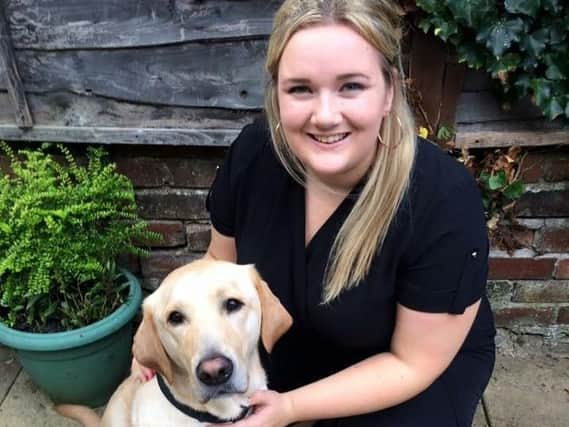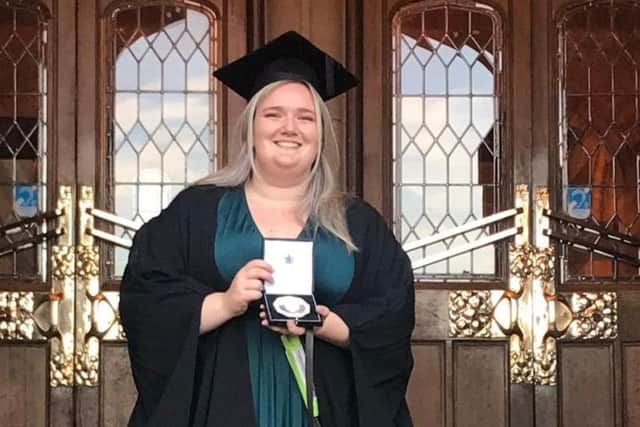University of Sheffield medal is a marker for Ellen’s journey with Usher Syndrome


When Ellen Watson’s friends were gaining their independence, she felt hers was slipping away.
Born with hearing impairments, she had become well-versed in reading visual clues. But at the age of 16, she lost that coping mechanism - and it was both quick and unexpected.
Advertisement
Hide AdAdvertisement
Hide AdThe now 23-year-old went to her local opticians after starting to struggle to see the whiteboard at school. A series of hospital appointments and medical screenings followed and after genetic testing, she was diagnosed with Usher Syndrome.


'Double whammy'
The main symptoms of the inherited condition are hearing and sight loss, which Ellen describes as a “double whammy”.
“Many people with autism experience bullying and name-calling - this is unacceptable” - What it is like living with autism“It was quite a big shock,” she says. “It is genetic but no one in my family we know of had ever had it. It was a very tricky time.
“When my friends were gaining their independence, mine felt like it was being taken away from me as my sight was declining. It became a lonely and difficult time for me.”
Advertisement
Hide AdAdvertisement
Hide AdEllen sight’s declined quickly, before reaching a plateau, and she is now registered blind.
“I think the hardest thing was that I had been trained as a child to use my vision to compensate for my hearing and that got flipped,” she reflects.
Wakefield charity launches thoughtful cards to help women with the distress of miscarriage“Losing your sight is losing something that’s very important to you and it is a grieving process coming to terms with that. It’s difficult but I think your instincts kick in.”
Guide dog support
As well as being supported by her school, family and friends, Ellen’s first guide dog Delthi helped her to adapt to life as a deafblind person.
Advertisement
Hide AdAdvertisement
Hide Ad“I got her when I was 17 so not long after I was diagnosed. She just transformed my life really. She gave me the freedom and independence to be like other 17-year-olds.
“Getting you from A to B is the primary role but it went beyond that. She gave me the confidence to go to a university - and one that was 200 miles from my home in Gloucestershire.”
Little Amelia’s rare condition means she can never be aloneEllen has recently graduated from the University of Sheffield with a degree in History and Politics, but that is not the only achievement from her time in Yorkshire.
She also received the university’s prestigious Chancellor’s Medal, an award recognising her academic excellence and advocacy for young people with disabilities.
Tireless campaigning
Advertisement
Hide AdAdvertisement
Hide AdShe has campaigned tirelessly for awareness including with Sense, a charity for deafblind people and those living with complex disabilities.
According to the charity, which named Ellen runner up Young Deafblind Person of the Year in 2015, half of disabled people say they are lonely.
Ellen worked on its loneliness campaign, encouraging people to see beyond disabilities and find similarities and shared interests in others. “It’s a very needless barrier that disabled people face,” she says.
Advertisement
Hide AdAdvertisement
Hide AdEllen has worked with the university’s Disability and Dyslexia Support service to ensure the campus is accessible for those in need of guide dogs and in 2017 was shortlisted for the charity Guide Dogs’ Young Person Achievement Award.
She has also shared ideas with the university on how adaptations can make departments more accommodating for disabled students.
Making a difference
“From day one, I was campaigning to try and adapt the university approach so I could access and enjoy my time exactly like other students did.
“My experience means that the next student that joins history or politics that has hearing or visual impairments, or both, is going to have a much easier life.”
Advertisement
Hide AdAdvertisement
Hide AdEllen’s second, and current, guide dog Skipp, who has supported her since Delthi retired due to ill-health during Ellen’s first year, became quite the talking point on campus, helping to raise awareness just by being there.
His support also meant Ellen was able to complete a year in industry, undertaking a placement at the Houses of Parliament with the Work and Pensions Committee.
She will return to London for a full-time job in September, this time with the Science and Technology Committee.
“The House of Commons is a bit of a maze. It is quite awe-inspiring and overwhelming for a sighted person let alone if you have hearing and visual impairments.
Advertisement
Hide AdAdvertisement
Hide Ad“Skipp had to acclimatise to Sheffield after training in Gloucestershire and then had to acclimatise again in London, where it’s incredibly busy. But he took it all in his stride and we managed to find our way in the end.
“The committee I worked for were brilliant. I want to get to a point in everything I do where my disability is a non-issue because I don’t let it define me. What I loved there is that it wasn’t a thing. It didn’t define me.”
Journey
In a letter Ellen received about the Chancellor’s Medal, she was praised for her professional development, her grades - on several occasions she was the top-ranked student in her cohort - and the work she had done to help make the university a more disability-friendly place.
Humble and honoured, she says she is thrilled she has been able to raise awareness of and challenge the barriers that students with disabilities encounter.
Advertisement
Hide AdAdvertisement
Hide Ad“After I was diagnosed with Usher Syndrome, I stayed in school, but given everything that was going on, I only sat two of my A-levels so to get into the University of Sheffield was amazing.
“To have been awarded this medal because of my academic achievements is an incredible feeling and is a real personal marker for me in terms of how far I have come.”
Nomination praise
Dr Felicity Matthews, a senior lecturer in the University of Sheffield’s Department of Politics, nominated Ellen for the Chancellor’s Medal.
She said: “Ellen has maximised all opportunities to immerse herself in her field of study and to apply this knowledge in the real world. She has been a powerful advocate for disability awareness and for young people with disabilities, undertaking media activities, public speaking, fundraising and campaigning on the national stage.
Advertisement
Hide AdAdvertisement
Hide Ad“In her characteristic way, both trailblazing and unwaveringly professional, she has made both her departments and the wider University a better place to be a student with hearing and/or visual impairments.”